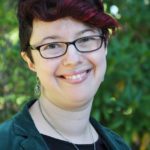
In this week’s service, our guest preacher explores the incredible impact seeing and acknowledging each other can have on our spirits.
Rev. Joanna Lubkin is the Unitarian Universalist Chaplain at Wellesley College and the Program Assistant for the UU Ministers Association. She is an affiliated community minister at Arlington Street Church in Boston, and studied at Andover Newton Theological School and Hebrew College Rabbinical School. Joanna sings in the Arlington Street Church choir and at The Sanctuary Boston.
Read the full sermon here.
